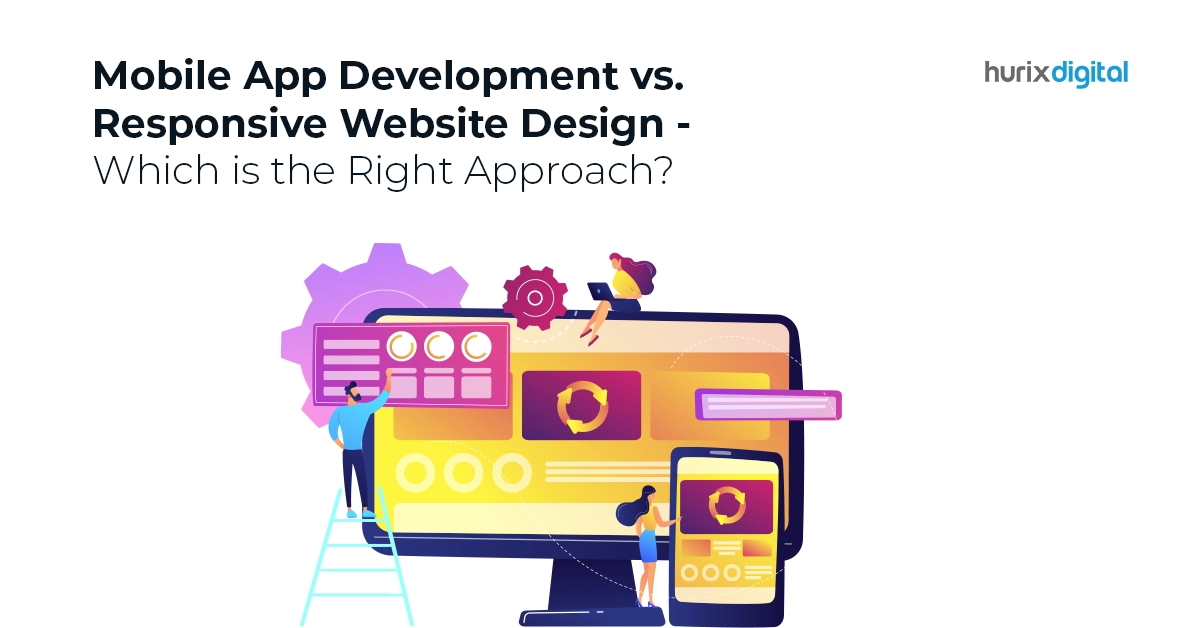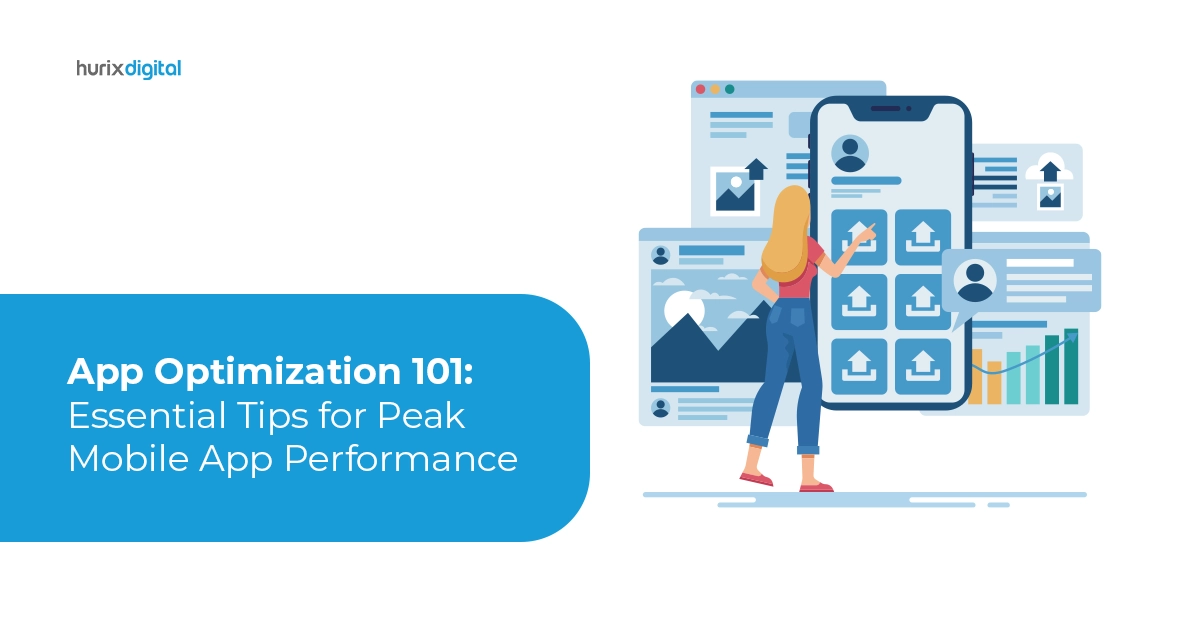
Mobile App Development vs. Responsive Website Design – Which is the Right Approach?
Summary
This article compares mobile app development and responsive website design. It discusses the advantages and limitations of each approach, helping businesses decide which solution best meets their needs based on factors like user experience, functionality, cost, and maintenance.
We live in a digital world, and establishing a solid online presence is essential. However, choosing the right digital strategy can be confusing for businesses. There are two primary ways to build that online presence: creating a mobile application or investing in responsive web design.
Both of these approaches have their pros and cons. However, the choice will depend on the business needs you want to fulfill. This article will discuss the two options and how to decide which one is more relevant for your business.
Table of Contents:
- Understanding Responsive Website Design
- Understanding Mobile App Development
- Factors That Will Help You Decide
- Wrapping Up
Understanding Responsive Website Design
Responsive website design is a cohesive approach to website design. The website can easily adapt to different screens, providing a superior user experience across all devices.
As per Google, 61% of users don’t return to a website if they have trouble accessing it via phone. Therefore, creating a responsive website design becomes important to drive business through your website.
There are several benefits of using a responsive website design. Let’s try to understand these benefits.
- Cost-effective: When you invest in a responsive website design, you save money. Creating a mobile app can be more expensive than creating a well-optimized website. A website that works well across devices will save you recurring expenses like maintenance costs.
- Better SEO: When you invest in responsive website development, there is a high chance that search engines will rank your website better than your competitors. Cross-platform compatibility is easier when you create a responsive website design, bringing in more organic traffic to your website.
- Improved Reach: A responsive website that offers a great user experience (UX) is usually accessed by a wider set of audience as it is compatible with all types of devices. Hence, you don’t miss out on potential customers using different types of devices.
- Easy Maintenance: While you might incur development costs while creating a responsive website, you will not spend a lot of time and money maintaining it. Also, every business needs to have at least a basic website. Therefore, instead of investing in both the website and the app, it is better to go ahead with a responsive website design, as maintaining a single website is easier.
Now that we know why responsive web design might work, it doesn’t need to be the right choice for you. Let’s try to understand the benefits of investing in mobile app development.
Also Read: Top 7 Reasons Why You Should Choose Flutter for Mobile App Development
Understanding Mobile App Development
Mobile apps have become quite common as every other business now has an app. However, there are only a certain number of apps that a user can have on their phone. Therefore, you need to analyze if a dedicated app will solve your purpose.
Mobile apps came into the limelight after Steve Jobs’ keynote speech in 2007. That year, the new iPhone was launched, which gave rise to the mobile app ecosystem. In 2008, the Apple App Store was launched with 500 apps.
An app can bring offline functionality, but you need to consider other aspects as well when you invest in mobile app development. Let’s look at the benefits of mobile apps.
- Better User Engagement: A mobile app gives you better avenues to engage with your users. You can send them push notifications throughout the day, informing them about offers and new updates. These notifications will keep redirecting the users to your mobile app.
- Offline Functionality: The best thing about creating an app is offline functionality. Most apps allow users to access content even without an active internet connection. Hence, if your business wants to focus on providing content on the go, going ahead with a mobile app development is the best way.
- Performance Optimization: Any app you create can be optimized to meet users’ needs. You can improve the app’s speed and performance in different ways. Hence, users will have access to a smooth app experience compared to a website.
- Better Money-Making Opportunities: Monetization becomes easy when you have a mobile app. You can integrate in-app purchases and several other features and invite users to pay for and access them.
However, mobile app development is a capital-intensive activity, and creating a cohesive app can take some time.
Factors That Will Help You Decide
You need to narrow down to a few important business objectives that you want to achieve before you choose between responsive web design and mobile app development. Let’s have a look at some of these factors and the right choice for each.
1. Broad Reach
While both apps and websites can feature on search results, a responsive website has a higher chance of making it to the top of the list. It allows you to reach a wider audience.
If you are new to business or not many people know you, users will choose to visit your website instead of downloading your app. Therefore, having a well-optimized website will serve your purpose.
2. Number of Updates
If you plan to update features regularly, you need to do a cost-benefit analysis. Updating a website requires less effort and money than updating apps.
Also, if you decide to update an app, you will have to update the native mobile app, and then it needs to get approved by different marketplaces. Hence, the process comes with a lot of hassle.
3. Offline Mode
If you want users to keep accessing your content even without the internet, you need to go ahead with mobile app development. Most gaming companies adopt this strategy, as they want users to keep using the app even without an active internet connection.
Also Read: Top 6 Mobile App Development Frameworks for 2024!
Wrapping Up!
Choosing between a mobile app and a responsive website design is a constant dilemma. However, once you chalk out what you want to achieve, it becomes easier to understand what your business needs the most.
Mobile apps tend to personalize the experience, but maintaining and making changes to a website is much easier. Therefore, try to lay down your business objectives before you make a decision.
To understand the difference better and understand which solution will suit your business better, you can get in touch with Hurix Digital. We provide innovative digital learning solutions by leveraging technology that will help you understand the digital landscape and how to make use of it.
Contact us to learn more!

Currently serving as the Vice President of Technology Delivery Operations at HurixDigital, a prominent global provider of digital content and technology solutions for publishers, corporations, and educational institutions. With over 16 years of experience spanning EdTech and various domains, I hold certification as a SCRUM Product Owner (CSPO). My expertise includes operations, finance, and adept people management skills.







